If the new diplomatic dialogue between the US and Cuba has you curious about Cuban culture, consider reading some of these books! Below, we’ve compiled some titles by Cuban authors, about Cubans, with a particular emphasis on memoir and poetry.
Little Havana Blues: A Cuban-American Literature Anthology
Edited by Virgil Suárez and Delia Poey
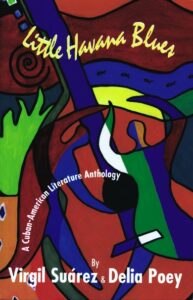 Little Havana Blues is a medley of voices—narrators, essayists and poets—that have come to forge a literary identity within the United States since their parents left Cuba to go into exile. However, this first comprehensive anthology of Cuban-American literature is not a symphony of the exile or immigrant generation and its letters. Instead, these writers are staking their claim on part of the American mosaic, with Pulitzer Prices and other awards in hand. But in their Americanization they are not rejecting their heritage or their Hispanic culture; rather they are Cubanizing, tropicalizing, expanding the realm of American culture and letters. Their vision is inclusive; their sources go deep into Anglo- and Hispano-European tradition and as deeply into Afro-Caribbean and mestizo culture, not to mention their love affair with popular culture and its icons.
Little Havana Blues is a medley of voices—narrators, essayists and poets—that have come to forge a literary identity within the United States since their parents left Cuba to go into exile. However, this first comprehensive anthology of Cuban-American literature is not a symphony of the exile or immigrant generation and its letters. Instead, these writers are staking their claim on part of the American mosaic, with Pulitzer Prices and other awards in hand. But in their Americanization they are not rejecting their heritage or their Hispanic culture; rather they are Cubanizing, tropicalizing, expanding the realm of American culture and letters. Their vision is inclusive; their sources go deep into Anglo- and Hispano-European tradition and as deeply into Afro-Caribbean and mestizo culture, not to mention their love affair with popular culture and its icons.
Included in Little Havana Blues are writers both established and burgeoning onto the literary scene: Pulitzer Prize winter Oscar Hijuelos, Rafael Compo, Gustavo Pérez Firmat, Margarita Engle, Roberto Fernández, Dolores Prida, Jose Yglesias and many others. Accompanying the selections are an introduction and bibliography by the editors.
Spared Angola: Memories from a Cuban-American Childhood
by Virgil Suárez
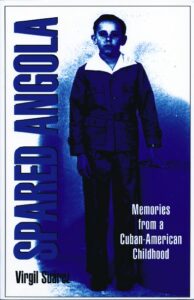 Spared Angola: Memories from a Cuban American Childhood is a powerful and original first collection of autobiographical stories, essays and poems. The successful novelist here lays bare the makings of his conscience as a writer and human being, detailing the psychological pressure of male expectations, family gender battles, emigration and adjusting to a new culture.
Spared Angola: Memories from a Cuban American Childhood is a powerful and original first collection of autobiographical stories, essays and poems. The successful novelist here lays bare the makings of his conscience as a writer and human being, detailing the psychological pressure of male expectations, family gender battles, emigration and adjusting to a new culture.
Hoping to spare their only child the fate of thousands of young Cubans conscripted to fight in the revolution in Angola, Suárez’s parents left Cuba, unaware of the sentence destiny would impose instead. Suárez’s compelling piece invokes the agony and frustration borne of growing up in terminal exile and cultural limbo. From anguish and turmoil, the artist has wrought one of the most eloquent and commanding voices of contemporary American literature.
Next Year in Cuba: A Cubano’s Coming-of-Age in America
by Gustavo Pérez Firmat
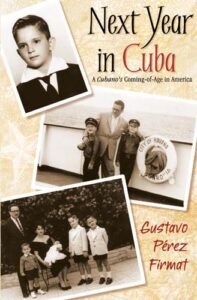 Gustavo Pérez Firmat arrived in America with his family at the age of eleven. Victims of Castro’s revolution, the Pérez family put their life on hold, waiting for Castro’s fall. Each Christmas, along with other Cuban families in the neighborhood, they celebrated with the cry, “Next year in Cuba.”
Gustavo Pérez Firmat arrived in America with his family at the age of eleven. Victims of Castro’s revolution, the Pérez family put their life on hold, waiting for Castro’s fall. Each Christmas, along with other Cuban families in the neighborhood, they celebrated with the cry, “Next year in Cuba.”
Growing up in the Dade County school system, and graduating from college in Florida, Pérez Firmat was insulated from America by the nurturing sights and sounds of Little Havana. It wasn’t until he left home to attend graduate school at the University of Michigan that he realized, as the Cuba of his birth receded farther into the past, he had become no longer wholly Cubano, but increasingly a man of two heritages and two countries.
In a searing memoir of a family torn apart by exile, Pérez Firmat chronicles the painful search for roots that has come to dominate his adult life. With one brother beset by personal problems and another embracing the very revolution that drove their family out of Cuba, Gustavo realized that the words “Next Year in Cuba,” had, for him, taken on a hollow ring. Now, married to an American woman, and father to two children who are Cuban in name only, Pérez Firmat has finally come to acknowledge his need to celebrate his love of Cuba, while embracing the America he has come to love.
The Child of Exile: A Poetry Memoir
by Carolina Hospital
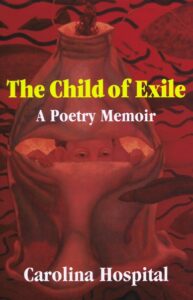 “The pain comes not from nostalgia . . . I write because I cannot remember at all,” Carolina Hospital explains in her poem, “Dear Tía.” Hospital’s poetry becomes the art of tracing her journey through exile and across both psychological and cultural borders. Hospital left Cuba as a child, accompanying her parents seeking refuge in the U.S. Her creative act of recall, in poems written between 1983 and 2003, the formative years in the poet’s life, chronicles her search for meaning and identity as a woman and a Latina living in the U.S.
“The pain comes not from nostalgia . . . I write because I cannot remember at all,” Carolina Hospital explains in her poem, “Dear Tía.” Hospital’s poetry becomes the art of tracing her journey through exile and across both psychological and cultural borders. Hospital left Cuba as a child, accompanying her parents seeking refuge in the U.S. Her creative act of recall, in poems written between 1983 and 2003, the formative years in the poet’s life, chronicles her search for meaning and identity as a woman and a Latina living in the U.S.
Hospital unravels the world around her, the hyphenated man, the vendors outside of the José Marti YMCA in Miami, the rafters who chart violent waters for a dream, and her own family and friends.
With stunning and sharp beauty, Hospital’s poems conjure a community caught between conflicting myths and cultures. She spins a wide range of themes: love and betrayal, motherhood and sacrifice, creation and the quest for faith, and loss of communication. In the end, this poetry memoir provides consolation, for it is in the common condition of exile and yearning to belong that we connect as human beings.
by Alfredo Fernández
Translated by Susan Giersbach Rascón
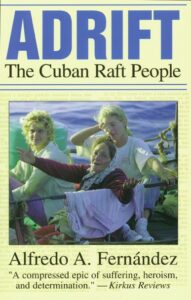 In Adrift: The Cuban Raft People, Alfredo Fernández surveys the turbulence produced an entire hemisphere away by the collapse of the USSR and concludes that, ironically, the greatest collateral damage has been inflicted not on the regime of Fidel Castro but rather upon the men, women, and children seeking to flee his dictatorship. For although U.S. immigration policy changed soon after, Castro’s grip on the Cuban people has remained unyielding, even as extraordinary economic crises have wracked the island. As a result, countless refugees seeking freedom have disappeared without a trace into the churning waters of the Florida Straits. And many of those rescued in international waters by U.S. naval vessels have simply been turned back over to the Cuban authorities.
In Adrift: The Cuban Raft People, Alfredo Fernández surveys the turbulence produced an entire hemisphere away by the collapse of the USSR and concludes that, ironically, the greatest collateral damage has been inflicted not on the regime of Fidel Castro but rather upon the men, women, and children seeking to flee his dictatorship. For although U.S. immigration policy changed soon after, Castro’s grip on the Cuban people has remained unyielding, even as extraordinary economic crises have wracked the island. As a result, countless refugees seeking freedom have disappeared without a trace into the churning waters of the Florida Straits. And many of those rescued in international waters by U.S. naval vessels have simply been turned back over to the Cuban authorities.
Focusing especially on the years 1994 through 1996 by which time the magnitude of the post-Soviet changes in Cuba had become fully apparent Fernández presents a compelling international gallery of survivors, victims, traitors, rogues, and heroes. From the infamous destruction of two unarmed private planes (sponsored by the humanitarian group Brothers to the Rescue) by Cuban MiGs in February 1996, to an afterword on the media-driven frenzy over five-year-old Elián González, found alone in an inner-tube two miles off Fort Lauderdale in November 1999 this is the powerful, true saga of two nations in conflict and the hapless people adrift between their shores.
Black Cuban, Black American: A Memoir
by Evelio Grillo
Introduction by Kenya Dworkin y Méndez
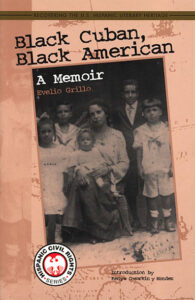 Arte Público Press’s landmark series “Recovering the U. S. Hispanic Literary Heritage” has traditionally been devoted to long-lost literary and historic works by Hispanics of decades and even centuries past. The publication of Black Cuban, Black American marks the first original work by a living author to become part of this notable series. The reason for this unprecedented honor can be seen in Evelio Grillo’s path-breaking life.
Arte Público Press’s landmark series “Recovering the U. S. Hispanic Literary Heritage” has traditionally been devoted to long-lost literary and historic works by Hispanics of decades and even centuries past. The publication of Black Cuban, Black American marks the first original work by a living author to become part of this notable series. The reason for this unprecedented honor can be seen in Evelio Grillo’s path-breaking life.
Ybor City, Florida, was once a thriving factory town populated by cigar-makers, mostly emigrants from Cuba. Growing up in Ybor City (now Tampa) in the early twentieth century, the young Evelio experienced the complexities—and sometimes difficulties—of life in a horse-and-buggy society demarcated by both racial and linguistic lines: Life was different depending on whether you were Spanish- or English-speaking, a white or black Cuban, a Cuban American or a native-born U.S. citizen, well-off or poor. (Even U. S.-born blacks did not always get along with their Hispanic counterparts.) Grillo captures the joys and sorrows of this unique world that slowly faded away as he grew to adulthood during the Depression. He then tells of his eye-opening experiences as a soldier in an all-black unit serving in the China-Burma-India theater of operations during World War II. Booklovers may have read of Ybor City in the novels of writer Jose Yglesias, but never before has the colorful locale been portrayed from this perspective.




